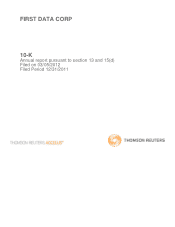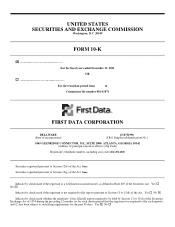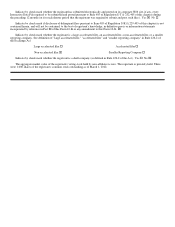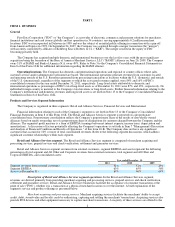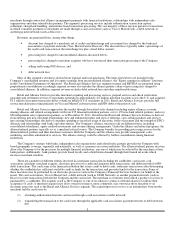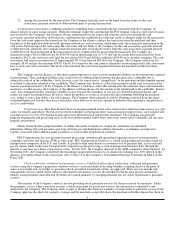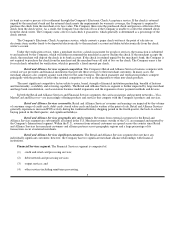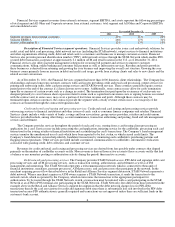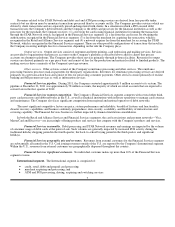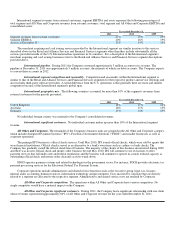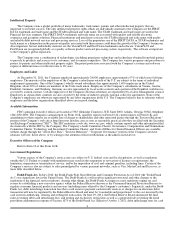First Data 2011 Annual Report Download - page 6
Download and view the complete annual report
Please find page 6 of the 2011 First Data annual report below. You can navigate through the pages in the report by either clicking on the pages listed below, or by using the keyword search tool below to find specific information within the annual report.
(3) paying the merchant for the transaction. The Company typically receives the funds from the issuer via the card
association, payment network or debit network prior to paying the merchant.
A transaction occurs when a cardholder purchases something from a merchant who has contracted with the Company, an
alliance partner or a processing customer. When the merchant swipes the card through the POS terminal (which is often sold or leased,
and serviced by the Company), the Company obtains authorization for the transaction from the card issuer through the card
association, payment network or debit network, verifying that the cardholder has sufficient credit or adequate funds for the transaction.
Once the card issuer approves the transaction, the Company or the alliance acquires the transaction from the merchant and then
transmits it to the applicable debit network, payment network or card association, which then routes the transaction information to the
card issuer. Upon receipt of the transaction, the card issuer delivers funds to the Company via the card association, payment network
or debit network. Generally, the Company funds the merchant after receiving the money from the card association, payment network
or debit network. Each participant in the transaction receives compensation for processing the transaction. For example, in a
transaction using a Visa or MasterCard for $100.00 with an interchange rate of 1.5% (the cap on certain debit transactions has been
changed to $0.21), the card issuer will fund the association $98.50 and bill the cardholder $100.00 on its monthly statement. The card
association will retain assessment fees of approximately $0.10 and forward $98.40 to the Company. The Company will retain, for
example, $0.40 and pay the merchant $98.00. The $1.50 retained by the card issuer is referred to as interchange and it, like assessment
fees, is set by the card association. The $0.40 is the merchant discount and is negotiated between the merchant and the merchant
acquirer.
The Company and its alliances, as merchant acquirers/processors, have certain contingent liabilities for the transactions acquired
from merchants. This contingent liability arises in the event of a billing dispute between the merchant and a cardholder that is
ultimately resolved in the cardholder's favor. In such a case, the transaction is "charged back" to the merchant and the disputed amount
is credited or otherwise refunded to the cardholder. The Company may, however, collect this amount from the card association if the
amount was disputed in error. If the Company or the alliance is unable to collect this amount from the merchant, due to the merchant's
insolvency or other reasons, the Company or the alliance will bear the loss for the amount of the refund paid to the cardholder. In most
cases, this contingent liability situation is unlikely to arise because most products or services are delivered when purchased, and
credits are issued on returned items. However, where the product or service is not provided until sometime following the purchase
(e.g., airline or cruise ship tickets), the risk is greater. The Company often mitigates its risk by obtaining collateral from merchants
considered higher risk because they have a time delay in the delivery of services, operate in industries that experience chargebacks or
are less creditworthy.
Prepaid services. First Data Prepaid Services manages prepaid stored-value card issuance and processing services (i.e. gift
cards) for retailers and others. The full-service stored-value/gift card program offers transaction processing services, card issuance and
customer service for over 200 national brands and several thousand small and mid-tier merchants. The Company also provides
program management and processing services for association-branded, bank-issued, open loop, stored-value, reloadable and one time
prepaid card products.
Money Network offers prepaid products to address the needs of employers, employees, merchants and unbanked
individuals. Money Network provides open loop electronic payroll distribution solutions that reduce or eliminate an employer's
expense associated with traditional paper paychecks as well as other prepaid retail solutions.
EFS Transportation Services provides payment processing, settlement and specialized reporting services for transportation
companies and owns and operates ATMs at truck stops. EFS Transportation Services is a closed loop payment processing system for
transportation companies in the U.S. and Canada. Its products offer truck drivers a convenient way to purchase fuel, access cash and
pay for repairs while on the road. Transportation companies use the processing system to manage their business daily through the
internet or real time via a direct connection to a host. In July 2011, the Company disposed of the ATM component of this business. In
November 2011, the Company contributed the remaining transportation business to an alliance in exchange for a 30% interest in that
alliance. For further detail on this transaction, refer to Note 18 of the Company's Consolidated Financial Statements in Item 8 of this
Form 10-K.
Check verification, settlement and guarantee services. TeleCheck offers check verification, settlement and guarantee
services using the Company's proprietary database system to assist merchants in deciding whether accepting checks at the point-of-
sale is a reasonable risk, or, further, to guarantee checks presented to merchants if they are approved. These services include risk
management services, which utilize software, information and analysis to assist the merchant in the decision process and include
identity fraud prevention and reduction. Revenues are earned primarily by charging merchant fees for check verification or guarantee
services.
The majority of the Company's services involve providing check guarantee services for checks received by merchants. Under
the guarantee service, when a merchant receives a check in payment for goods and services, the transaction is submitted to and
analyzed by the Company. The Company either accepts or declines the check for warranty coverage under its guarantee service. If the
Company approves the check for warranty coverage and the merchant accepts the check, the merchant will either deposit the check in
4

